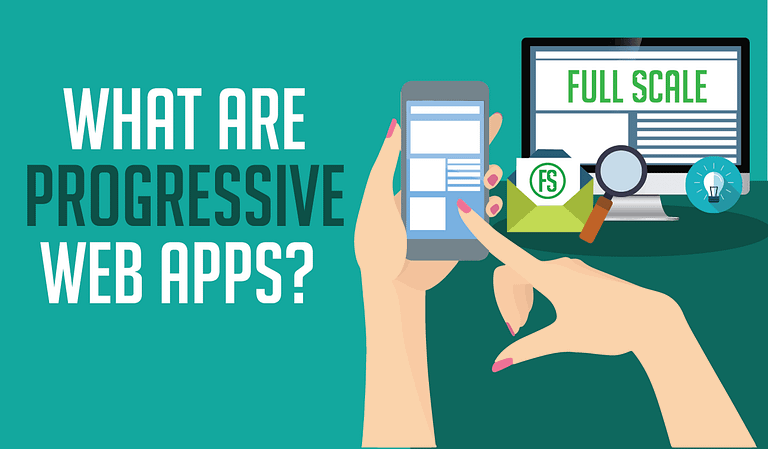Last Updated on 2024-11-10
What are Progressive Web Apps (PWA)? Why are more companies using them? In this article, you will learn more about PWA and the benefits it can provide to your startup business.
The advent of smartphones and other devices brought forth native apps. These days, one can hardly make online transactions without using an app. From banking to online shopping, you need to log in to an app to complete your business. That’s why business owners ask, should we build an app? The answer is: it depends on your business.
Building and maintaining native apps is expensive and time-consuming. Not all businesses have the resources to build and maintain one. Fortunately, Progressive Web Apps are available as an option. So, why is PWA a great alternative to native apps? First, you need to know what it is.
What is a Progressive Web App?
PWAs are applications built using web technologies such as HTML and CSS alongside programming languages like JavaScript. They may be web apps but can function and feel like native apps.
Built and enhanced with modern Application Programming Interfaces (APIs), PWAs can deliver improved capabilities. They are also reliable and able to reach anyone using any device.
Three Pillars of PWA
PWAs are developed with the following principles in mind:
Capable
With Web Assembly and new APIs, PWAs are more than capable of providing what platform-specific apps provide. For example, Squoosh.app uses C, C++, and Rust to advance image compression. For a web application, this was unheard of before.
Reliable
Speed is critical in business. This is also true in e-commerce. Having a reliable loading-time speed will lower the bounce rate. Also, users like apps that register their interactions instantly. That is why reliable PWAs are fast and dependable regardless of what network is used.
Installable
Progressive Web Applications should be installable. Installed PWAs can run whether on a browser tab or a standalone window. Even if they are not native apps, users should feel that they are part of the device. Also, PWAs are launchable from the user’s dock, shelf, taskbar, or home screen.
These three pillars help PWAs feel like they are platform-specific apps.
What Makes a Good PWA?
Progressive Web Apps are gaining popularity. You can tell because companies such as Twitter, Starbucks, Pinterest, Uber, Spotify, and many more are using PWA. As their use becomes more popular, it is important to know what makes a good web application.

Screen Size Responsiveness
Smart devices come in different screen sizes. It is important then that you have responsive web apps to different screen sizes. The contents and viewpoints should be responsive whether the user is using a smartphone or a tablet.
Easy to Install
When users install an app, expect that they will use it often. Therefore, make your PWAs installable. That way, users can easily install your web application and enjoy them like regular platform-specific apps.
Provides Offline Experience
Users want to experience their apps offline. They want travel apps to show trip details and have a playback option for their music even when offline. So, it is best to give users a custom offline experience instead of reverting to a default offline page.
Discoverable through Search Engines
Your web application helps generate traffic to your app. To do this, make sure that your Progressive Web App has a URL. Search engines such as Google should be able to index your PWA’s URL to your native app or site.
Works in Any Browser
As its name suggests, PWA is a web app. Therefore, your application should work in any browser. Whether the user installs them in Google Chrome, Microsoft Edge, or any other browser, they should work perfectly.
Have App Icons
As stated above, Progressive Web Apps are installable. So, they need to have an icon, which will make them more recognizable to users.
Works with Any Input Devices
Just like having different screen sizes, different devices work with various input methods. Some use a mouse and others touch screens. Your PWA should work with these different inputs. It would allow your users to switch to different input methods while enjoying your application.
Now that you learned what makes good Progressive Web Apps, it’s time to know why companies are using them.
Why Use PWAs?
The reason why businesses are pushing to create apps is that app engagement impacts revenue directly. Apps streamline and automate many processes, including the customer’s buying process. People who download your apps are more likely to purchase or sign up for your offers. Also, features such as push notifications help in re-engaging users.
With so many benefits, here are reasons why PWAs are a great alternative for native apps:
- Your users don’t have to go to different app stores to enjoy your application.
- PWAs are buildable using common web technologies.
- Maintenance is easier with fewer code-bases.
- Your PWAs are more responsive to different screen sizes.
- They are fast and lightweight.
- Unlike your regular website, your PWAs work offline.
- Searchable using search engines and also available in app stores.
- Using PWAs can lead to higher customer engagements.
- Also, features push notifications to re-engage users.
- They are cheaper to build than platform-specific apps.
Even with these advantages, some companies still prefer developing apps. Although Progressive Web Applications are now capable of deeper access to smartphone operating systems, they still have many limitations. For instance, PWAs are not ideal when building high-performance mobile games.
Conclusion
Should you build a PWA for your website? It depends on your needs. Even if PWAs bring many benefits and are cheaper, you have to consider your target audience. Are web apps important to your target market? Would developing a PWA help your business goal? If yes, then go ahead and build one.
Your web apps offer a unique experience to your users. It also does wonders for your brand. Therefore, it makes sense to consider a PWA in your development strategy.
Thinking about creating a progressive web application for your website? We at Full Scale help startups and businesses develop their own applications. With our talented and experienced developers, programmers, QAs, and other specialists, we will help you build your dream team to achieve your business goals.
Contact us today, and let’s start working on achieving your goals!

Matt Watson is a serial tech entrepreneur who has started four companies and had a nine-figure exit. He was the founder and CTO of VinSolutions, the #1 CRM software used in today’s automotive industry. He has over twenty years of experience working as a tech CTO and building cutting-edge SaaS solutions.
As the CEO of Full Scale, he has helped over 100 tech companies build their software services and development teams. Full Scale specializes in helping tech companies grow by augmenting their in-house teams with software development talent from the Philippines.
Matt hosts Startup Hustle, a top podcast about entrepreneurship with over 6 million downloads. He has a wealth of knowledge about startups and business from his personal experience and from interviewing hundreds of other entrepreneurs.






